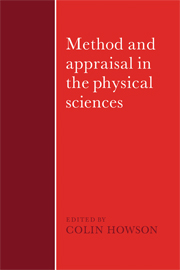Book contents
- Frontmatter
- Contents
- Editorial preface
- History of science and its rational reconstructions
- Atomism versus thermodynamics
- Thomas Young and the ‘refutation’ of Newtonian optics: a case-study in the interaction of philosophy of science and history of science
- Why did oxygen supplant phlogiston? Research programmes in the Chemical Revolution
- Why did Einstein's Programme supersede Lorentz's?
- The rejection of Avogadro's hypotheses
- On the critique of scientific reason
- Index of Names
On the critique of scientific reason
Published online by Cambridge University Press: 04 August 2010
- Frontmatter
- Contents
- Editorial preface
- History of science and its rational reconstructions
- Atomism versus thermodynamics
- Thomas Young and the ‘refutation’ of Newtonian optics: a case-study in the interaction of philosophy of science and history of science
- Why did oxygen supplant phlogiston? Research programmes in the Chemical Revolution
- Why did Einstein's Programme supersede Lorentz's?
- The rejection of Avogadro's hypotheses
- On the critique of scientific reason
- Index of Names
Summary
Summary
The historical studies on which the following essay comments use the idea of a research programme (explained in the first essay by Lakatos) and define two types of relation between research programmes and the evidence. Let me call these types type A and type L respectively. They examine episodes where one research programme, R′, replaces another research programme, R′ (or fails to be replaced by it), i.e. R″ is made the basis of research, argument, metaphysical speculation by the great majority of competent scientists. The authors find that the relation of R″ to the evidence is always of type L while that of R′ is of type A (other circumstances being present when this is not the case). Assuming the historical analysis to be correct this is an interesting sociological law. The authors do not present their results in such terms, however. Making A and L part of a normative methodology, they claim to have shown that the acceptance of R″ was rational while the continued defence of R′ would have been irrational, and they express this belief of theirs by calling research programmes exhibiting relation L to the evidence progressive research programmes, while research programmes which stand in relation A to the evidence are called degenerating. They also claim that such judgements are objective, independent of the whims and subjective convictions of the thinkers who make them. Using such a normative interpretation of their sociological results they also claim to possess arguments for and against research programmes.
- Type
- Chapter
- Information
- Method and Appraisal in the Physical SciencesThe Critical Background to Modern Science, 1800–1905, pp. 309 - 339Publisher: Cambridge University PressPrint publication year: 1976
- 9
- Cited by



